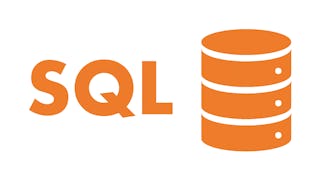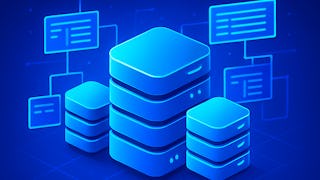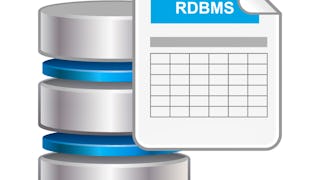Database management systems are a crucial part of most large-scale industry and open-source systems. This course will introduce you to important concepts of database systems and design. We will learn what relational databases are, what they are used for, the theory underlying their design, and how to query and modify a database using the declarative SQL language.

Enjoy unlimited growth with a year of Coursera Plus for $199 (regularly $399). Save now.

Introduction to Relational Databases
This course is part of multiple programs.


Instructors: Gerald Balekaki
3,540 already enrolled
Included with
(32 reviews)
Recommended experience
What you'll learn
Describe what relational databases are, and how they are used.
Master the Relational Database Model.
Demonstrate comprehensive SQL skills.
Skills you'll gain
Details to know

Add to your LinkedIn profile
21 assignments
See how employees at top companies are mastering in-demand skills

Build your subject-matter expertise
- Learn new concepts from industry experts
- Gain a foundational understanding of a subject or tool
- Develop job-relevant skills with hands-on projects
- Earn a shareable career certificate

There are 4 modules in this course
Welcome to Introduction to Relational Databases! In this course, we will cover the topics of: Database Overview, Relational Algebra, SQL. This learning module provides a comprehensive introduction to relational databases, their applications, and components. Starting with an introduction to databases and their diverse applications, the module discusses the components of relational database schemas, including relations, attributes, and keys. Students will learn to design simple database schemas and understand key database concepts such as records, data retrieval and modification, and primary/foreign keys. The module includes real-world examples for practical understanding.
What's included
7 videos9 readings6 assignments1 discussion prompt
This learning module explores the fundamental concepts and operations of relational algebra, the theoretical foundation of relational databases. It introduces basic relational algebra concepts such as 'relation', 'tuple', and 'operation', and then dives into fundamental relational algebra operations, including selection, projection, and union. Students will also learn about more advanced operations like joins and division, expanding their understanding of how complex data relationships can be managed. Further, the module will cover composite and aggregation operations to handle more intricate data manipulations, as well as operations for modifying relations. This module gives students a firm theoretical foundation to work with relational databases.
What's included
7 videos5 readings6 assignments
This learning module provides an in-depth understanding of SQL (Structured Query Language), the standardized language used for managing relational databases. Starting with the fundamentals, students will learn to utilize SELECT and set operations to extract relevant information from database tables. The module then transitions into more complex queries involving joins, enabling students to locate and amalgamate information from multiple database tables. It further delves into modifying database tables, defining their structures, creating referential integrity constraints to maintain database consistency, and controlling user database access via SQL commands. Learning SQL will equip students with the knowledge and skills necessary to effectively manage and manipulate data in relational databases .
What's included
12 videos6 readings8 assignments
This module contains the summative course assessment that has been designed to evaluate your understanding of the course material and assess your ability to apply the knowledge you have acquired throughout the course. Be sure to review the course material thoroughly before taking the assessment.
What's included
1 assignment
Earn a career certificate
Add this credential to your LinkedIn profile, resume, or CV. Share it on social media and in your performance review.
Build toward a degree
This course is part of the following degree program(s) offered by Illinois Tech. If you are admitted and enroll, your completed coursework may count toward your degree learning and your progress can transfer with you.¹
Offered by
Explore more from Data Analysis
 Status: Preview
Status: PreviewUniversitat Politècnica de València

Birla Institute of Technology & Science, Pilani
 Status: Free Trial
Status: Free Trial Status: Free Trial
Status: Free Trial
Why people choose Coursera for their career




Frequently asked questions
To access the course materials, assignments and to earn a Certificate, you will need to purchase the Certificate experience when you enroll in a course. You can try a Free Trial instead, or apply for Financial Aid. The course may offer 'Full Course, No Certificate' instead. This option lets you see all course materials, submit required assessments, and get a final grade. This also means that you will not be able to purchase a Certificate experience.
When you enroll in the course, you get access to all of the courses in the Specialization, and you earn a certificate when you complete the work. Your electronic Certificate will be added to your Accomplishments page - from there, you can print your Certificate or add it to your LinkedIn profile.
Yes. In select learning programs, you can apply for financial aid or a scholarship if you can’t afford the enrollment fee. If fin aid or scholarship is available for your learning program selection, you’ll find a link to apply on the description page.
More questions
Financial aid available,





